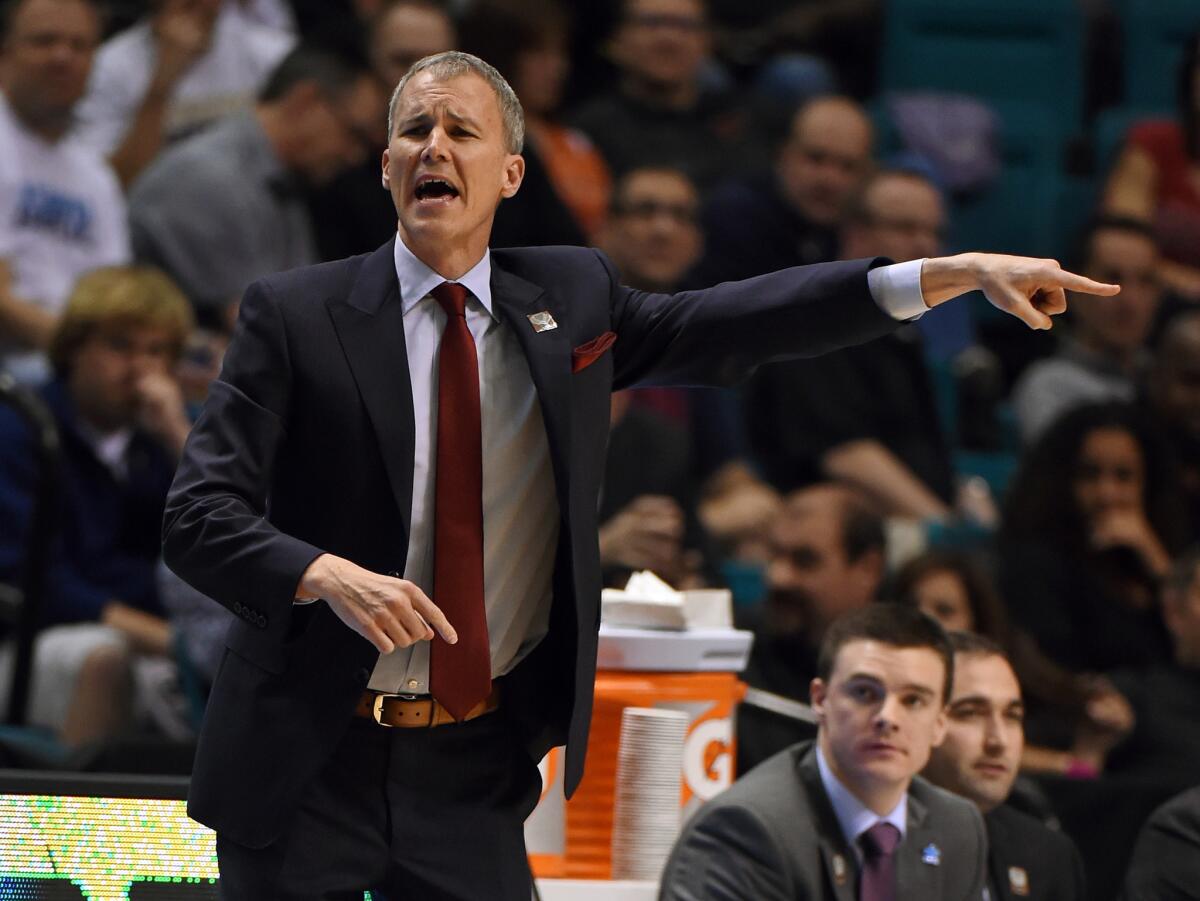USC flew under the radar and is back in the NCAA tournament

USC Coach Andy Enfield gestures during a Pac-12 quarterfinal game against Utah.
- Share via
Over the last four months, the USC basketball team was the best show in town … that few people saw.
The Trojans spent the majority of their season in anonymity, as local sports fans were busy decrying the downtrodden state of the Lakers or wondering what went wrong with the traditional college powerhouse from the other side of the city.
Unfortunate? Sure.
Based on the entertainment value of their up-tempo, high-flying act, the Trojans deserved to be playing in front of more than 4,607 fans, which is what they averaged for 18 home games.
However, the team’s low profile is what made Sunday possible. It’s why USC is returning to the NCAA tournament for the first time in five years.
Coach Andy Enfield’s team was last in the Pac-12 Conference last year. It was last the year before that too.
USC’s football coach wouldn’t survive after two seasons like that, regardless of the circumstances. Neither would UCLA’s basketball coach. Don Mattingly was nearly fired as the manager of the Dodgers after half a season like that, in 2013.
But the USC basketball team’s position as an afterthought in this congested market bestowed Enfield with a valuable commodity afforded to too few coaches in the modern era of sports: Time.
Listening to Enfield on Sunday, it was clear time was absolutely necessary to rebuild the Trojans program.
When Enfield was hired by USC in April of 2013, he encountered obstacles that were nonexistent when he became the head coach of Florida Gulf Coast two years earlier.
“When I took over Florida Gulf Coast with our coaching staff, we were in a similar situation as USC,” Enfield said. “The difference was, we were able to recruit five players in the spring …”
Four of the five were eligible to play at the start of the next season. Florida Gulf Coast won the Atlantic Sun Conference tournament in 2013, then made a shocking run as a No. 15 seed to a regional semifinal at the NCAA tournament.
There was no such luxury at USC. By the time Enfield became the Trojans coach, high school players with the necessary ability to compete in a power conference had already signed elsewhere. Enfield landed Katin Reinhart, but Reinhart’s status as a transfer from Nevada Las Vegas made him ineligible for a season.
“We knew right away we wouldn’t have that recruiting help for that first year, so Year 2 was like Year 1 at Florida Gulf Coast,” Enfield said.
The coach had to wait an entire year before landing his first real recruiting class. That class, which included point guard Jordan McLaughlin and shooting guard Elijah Stewart, became the backbone of the current Trojans team.
Enfield made the conscious decision to recruit high school players such as McLaughlin and Stewart instead of junior college players who would have shorter learning curves.
“Our goal is to build a program with some sustainability,” he said.
The result? More waiting.
As incoming freshmen last season, McLaughlin and Stewart immediately became key parts of the team. There was a downside to that, however.
“We lost a lot of close games and our decision-making and skill levels were not good enough to win those games,” Enfield said.
Enfield acknowledged he didn’t know what to expect at the start of this season.
If the players were waiting for their breakthroughs, Enfield was waiting for one of his own. Coaching Florida Gulf Coast in the Atlantic Sun Conference was nothing like coaching USC in the Pac-12.
“An 18-game schedule in the Pac-12, it’s a grind to play that level of competition on a nightly basis,” Enfield said. “At the mid-major level, you basically have to win three games in your conference tournament.”
The Trojans answered Enfield’s questions, compiling a 21-12 record, including 16-2 at home. Their ultimate reward came Sunday, prompting Enfield and his players to reflect on how they got there.
“Just from going to that feeling of being the laughingstock of the conference to now being in the NCAA tournament, it’s indescribable,” said junior point guard Julian Jacobs, who was recruited by Enfield’s predecessor, Kevin O’Neill.
Jacobs admitted there were times he wondered whether he would ever play in the national tournament.
Enfield said he didn’t.
“We didn’t know how long it would take, but that was our plan and we continue to stick with it,” Enfield said. “We’ll continue to do it next year as well.”
Only now, people will be watching.
Twitter: @dylanohernandez
Fight on! Are you a true Trojans fan?
Get our Times of Troy newsletter for USC insights, news and much more.
You may occasionally receive promotional content from the Los Angeles Times.




